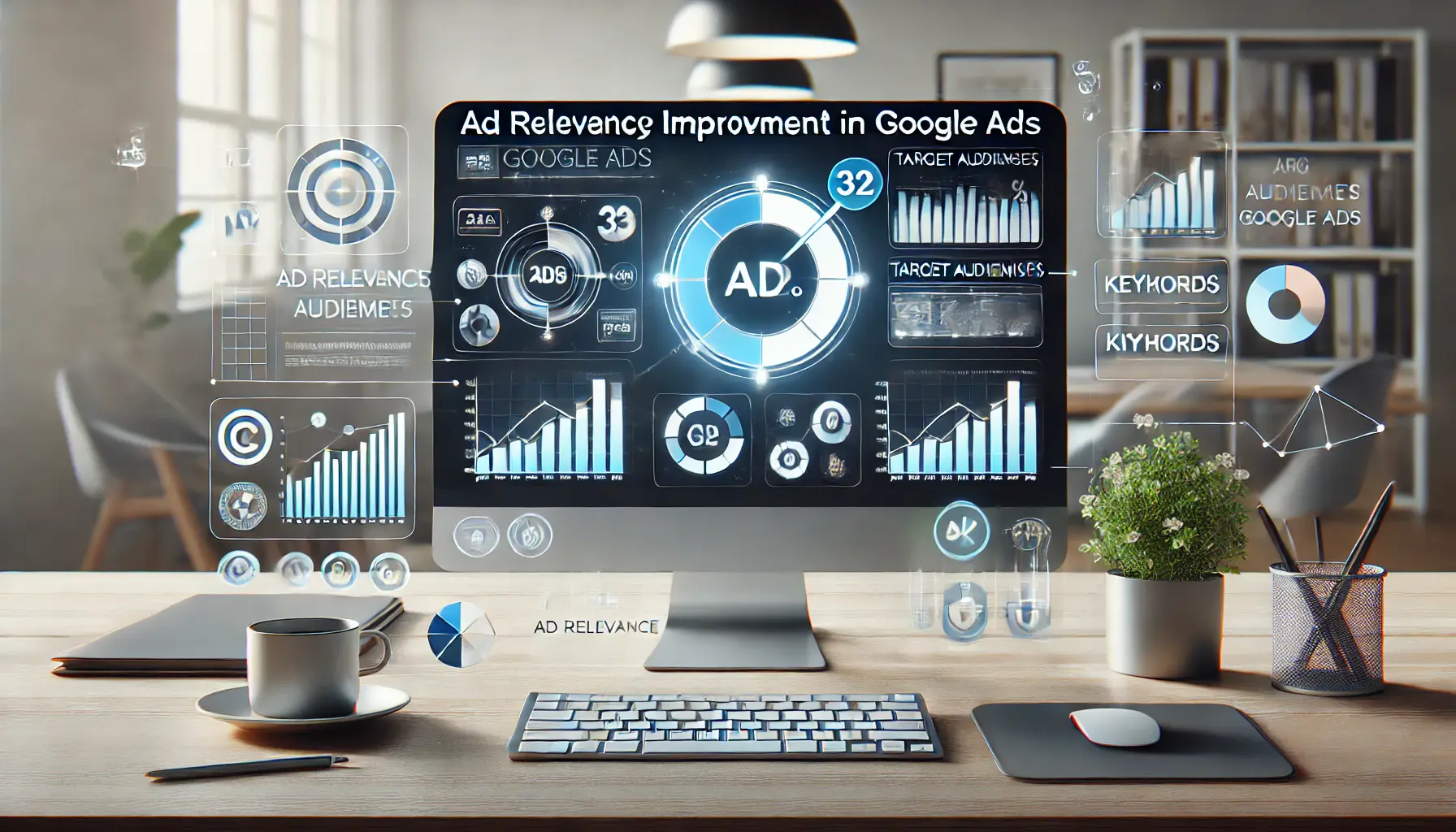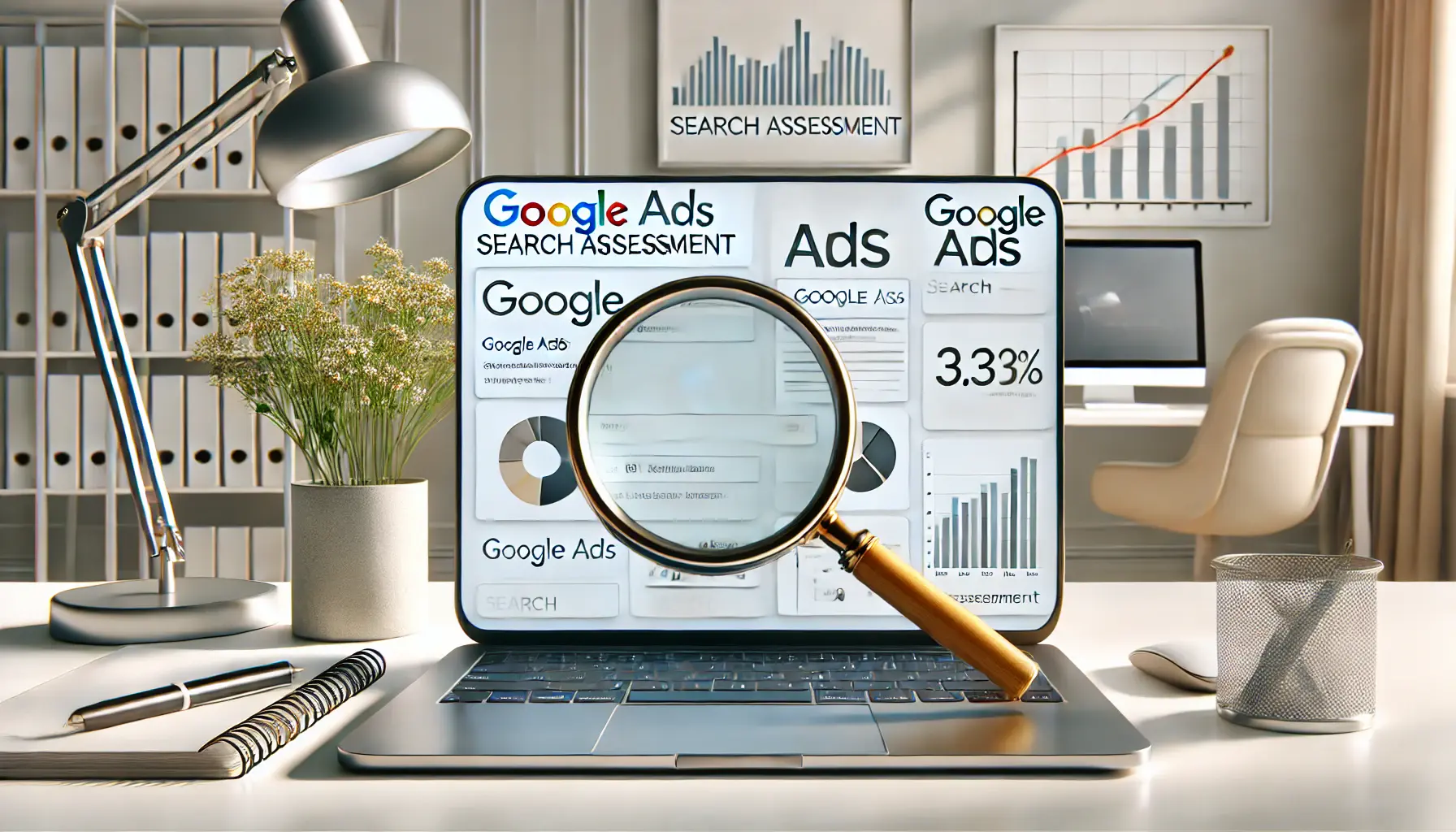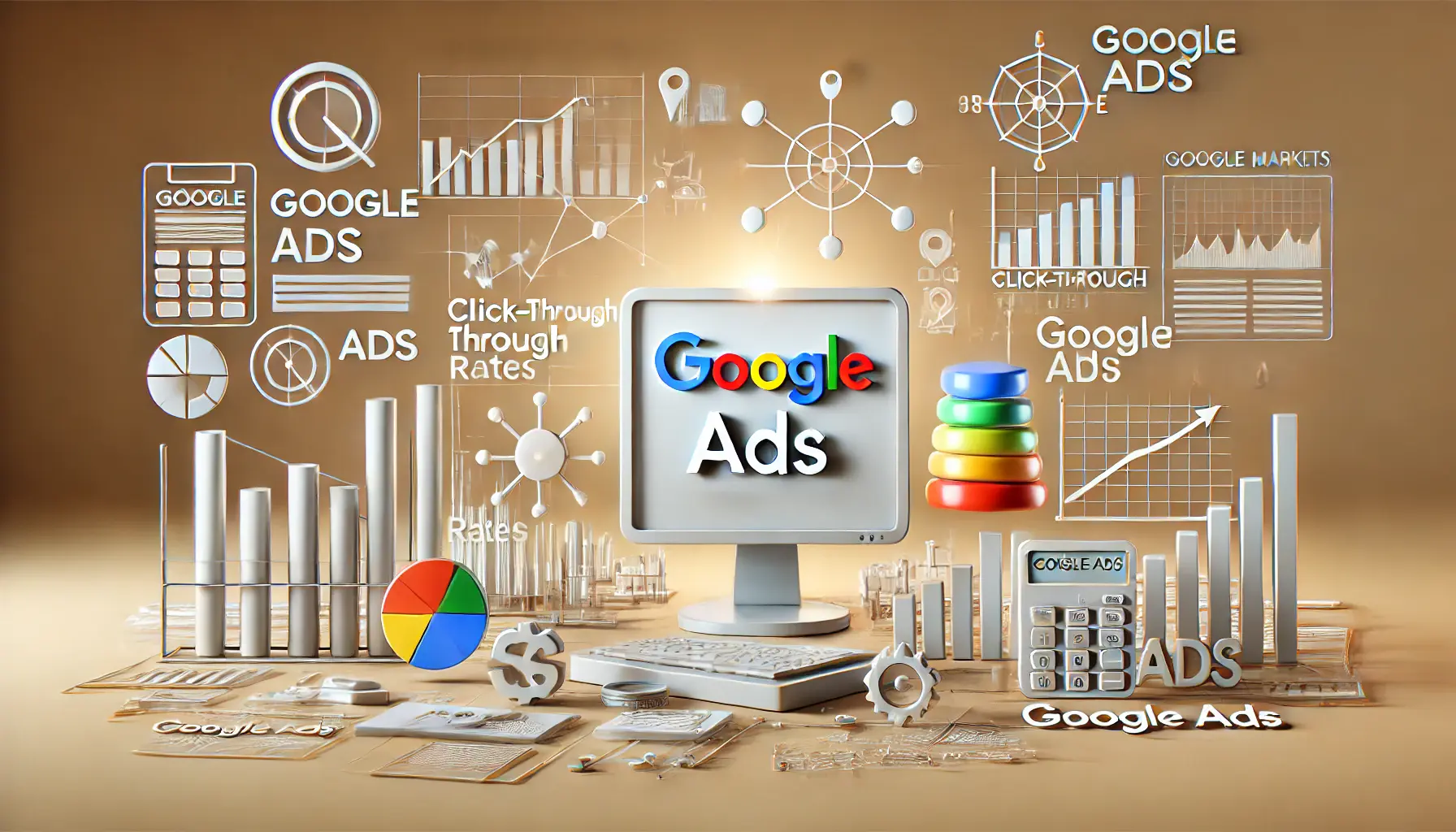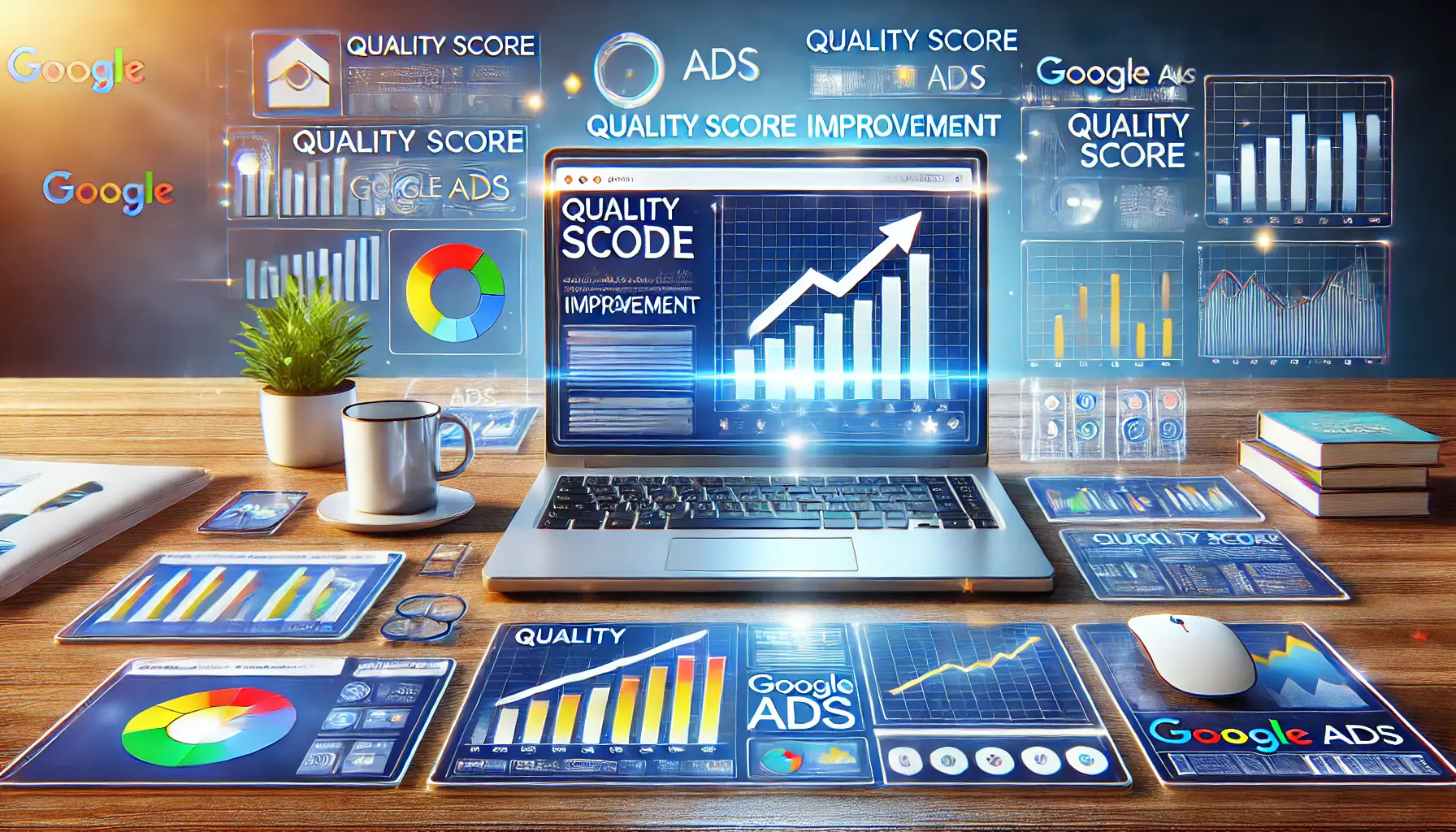Probably, the biggest challenge of digital marketing is how to reach your target audience with your ads on time.
If you are running any campaigns through Google Ads, you must have heard many times the term Ad Relevance.
It is a critical factor based on which not only the visibility of your ads gets determined but their performance too.
Improving Ad Relevance can make a huge difference in campaign success, driving higher CTRs, better quality scores, and ultimately, improved ROI.
Ad Relevance is not just about the content of your ads; it relates to how well they correspond with what users are searching for.
Whether you want to create an ad on Google for the first time or refine your current ad campaign, this guide will walk you through a step-by-step process for Ad Relevance Improvement in Google Ads.
After reading the article, you will understand why relevance matters in ads and how to optimize Ad Relevance for your marketing needs.
- What Ad Relevance in Google Ads Really Means
- How Google Measures Ad Relevance
- Enhance Relevance with Better Ad Copy Optimization
- Targeting Strategies to Improve Ad Relevance
- Landing Page Optimization to Improve Relevance
- Final Thoughts on Ad Relevance Improvement in Google Ads
- Frequently Asked Questions about Ad Relevance in Google Ads
What Ad Relevance in Google Ads Really Means
At its core, Ad Relevance refers to how closely your ads match the intent behind the keywords you’re targeting.
It is a key metric within Google Ads for determining how useful your ads are to user search queries.
Having a high Ad Relevance score can lead to more successful ad campaigns and better results.
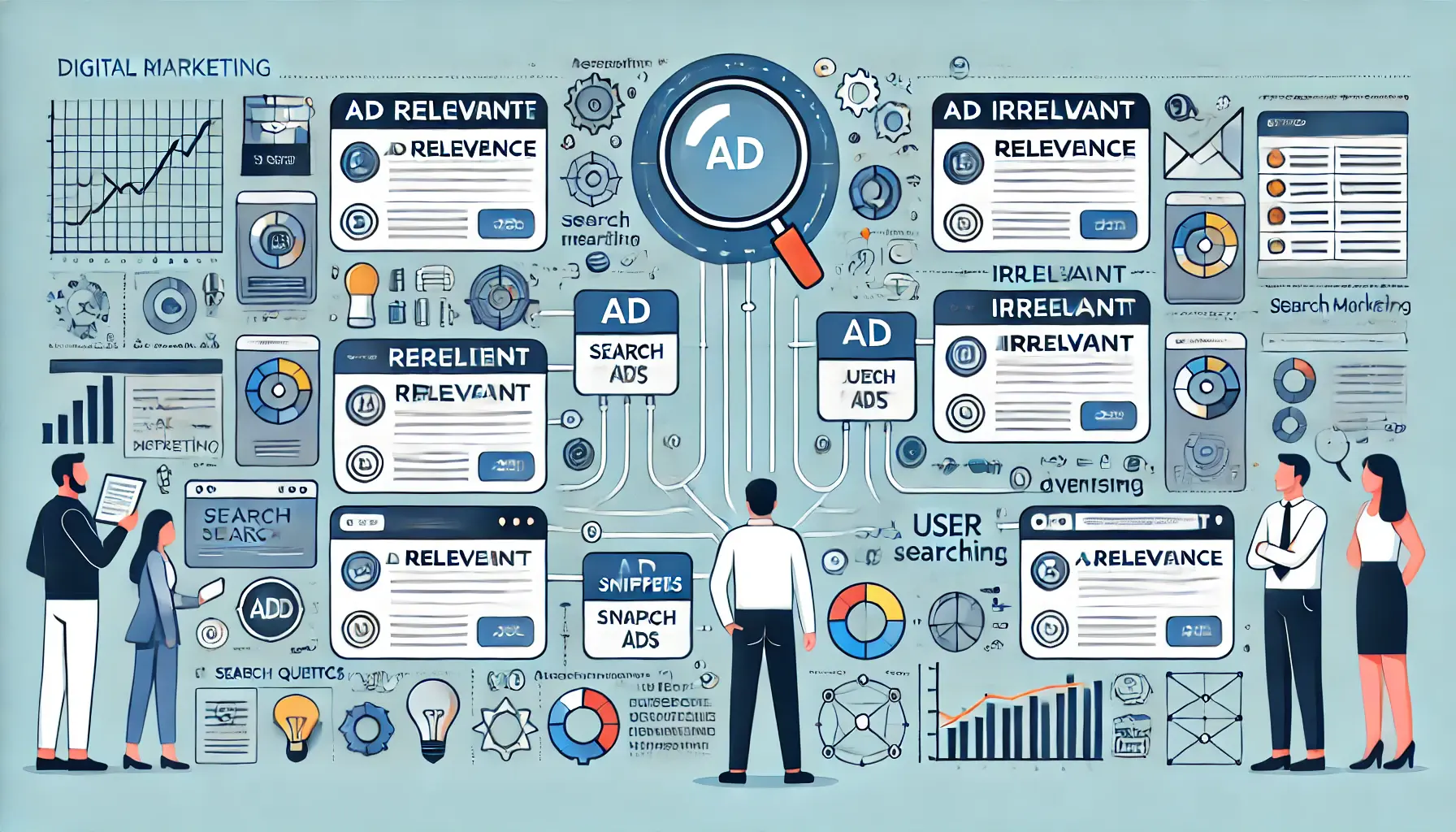
Visualizing the importance of ad relevance in matching content to user intent.
What is Ad Relevance?
Ad Relevance is one of the three major components that Google uses to calculate your quality score, alongside expected click-through rate (CTRClick-Through Rate, the percentage of users who click on your ad after seeing it.) and landing page experience.
Essentially, it measures the connection between your ad copy and the keywords you’re bidding on.
The closer the match, the higher your relevance score will be.
For example, if someone searches for “best running shoes” and your ad talks about hiking boots, even though both are related to footwear, they do not relate to what the searcher is looking for, resulting in low Ad Relevance.
If your ad copy specifically mentions “top running shoes,” the relevance is much higher, and Google will reward you with better ad placements and lower CPCCost Per Click, the amount paid for each click on your ad..

Illustrating key metrics that show the impact of ad relevance on campaign performance.
Why Ad Relevance Matters for Campaign Success
Here’s why Ad Relevance is important for your campaigns:
- Better Quality Scores: The better the relevance of your ad, the better your quality score will be. This reduces your ad spend and improves ad rank.
- Increased Click-Through Rates: Ads that show relevance to user searches stand a better chance of being clicked, driving more traffic to your website.
- Lower Costs: A high relevance score cuts down your CPC, allowing you to stretch your ad budget further.
- Improved Conversion Rates: When ads match user intent, it’s easier to convert clicks into actual sales or leads.
As you can clearly see, Ad Relevance is crucial for ensuring the effectiveness of your Google Ads campaigns.
But how does Google measure this important metric?
The next section will explain it in detail.
Ad Relevance directly impacts how well your ads align with user searches, which can significantly influence campaign success.
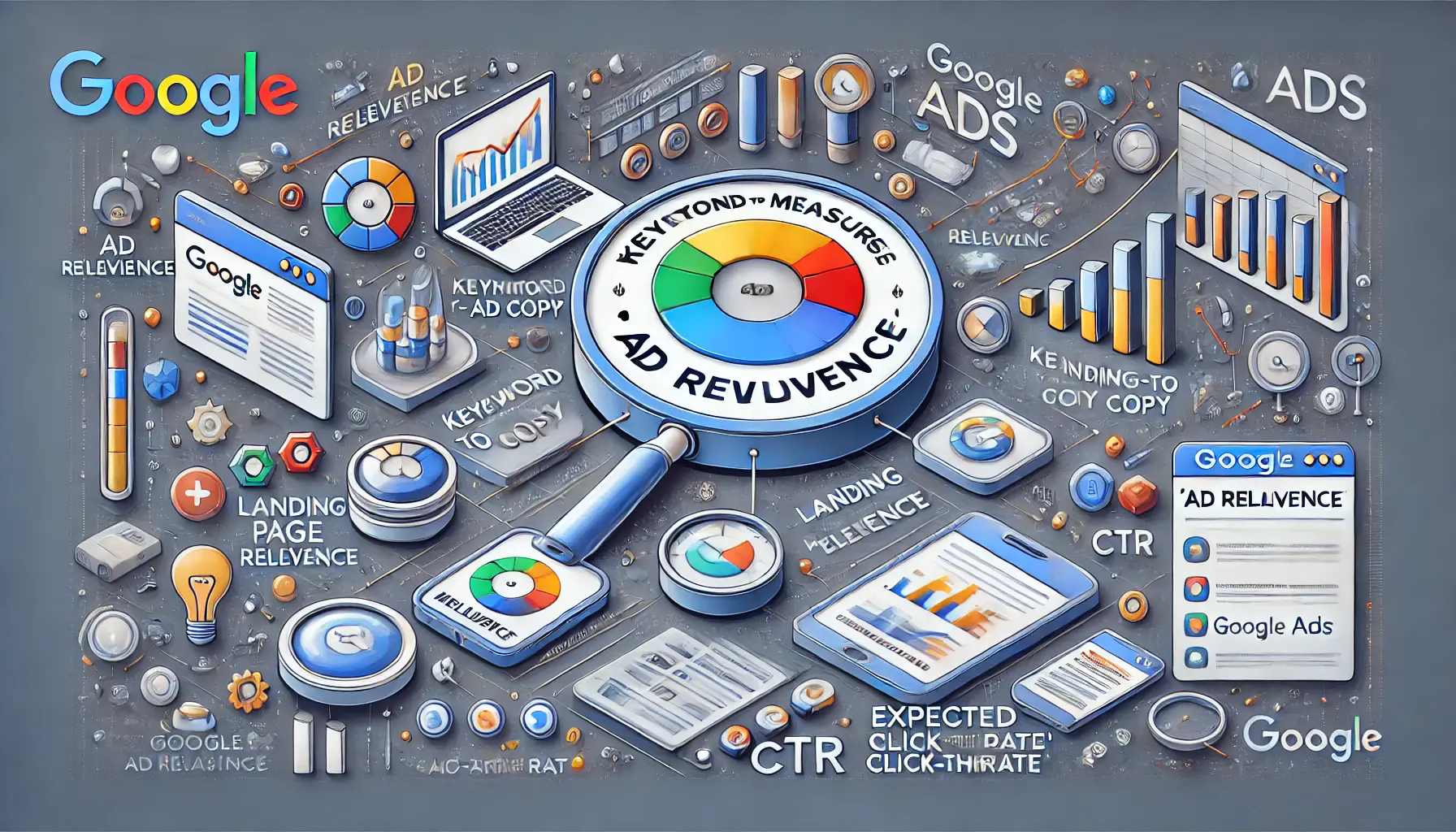
Visualizing the key factors used by Google to assess ad relevance.
How Google Measures Ad Relevance
The relevance of an ad is one component in the overall quality score formula of Google Ads.
This score plays a huge role in determining how well an ad performs in auctions, what it pays for every click, and where the ad will appear in search results.
Simply put, the better your Ad Relevance, the better your chances of showing up in top positions at a lower cost.
Google evaluates Ad Relevance through a series of factors to ensure your ads are matched to the intent of the user’s search.
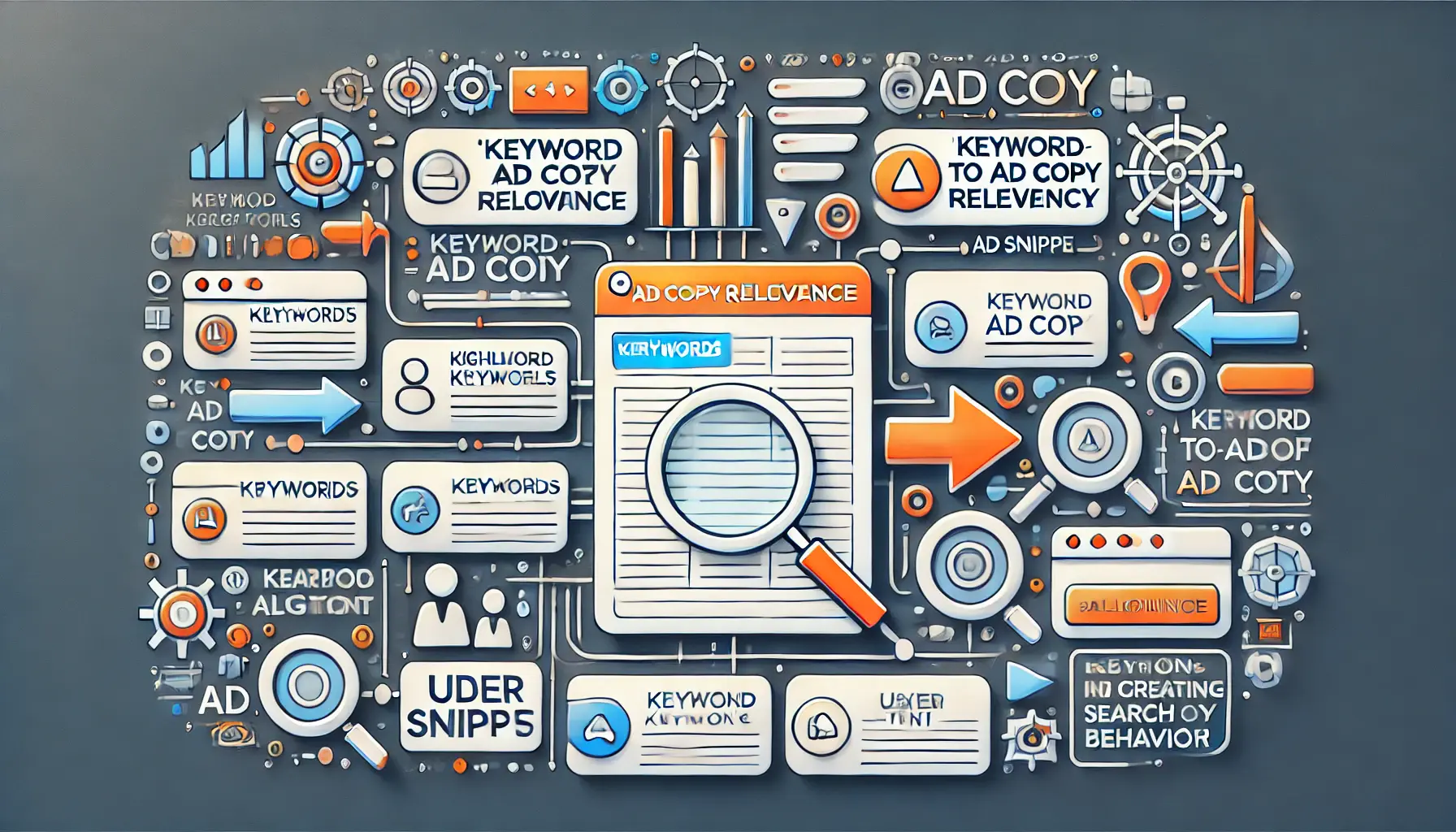
Visualizing the importance of aligning keywords with ad copy for effective advertising.
Keyword-to-Ad Copy Relevance
The first and most direct factor Google considers is how closely your ad copy relates to the keywords you are bidding on.
While the ad must contain keywords that users are searching for, it also has to read naturally and offer valuable information.
It is not just about stuffing your ad with keywords; Google values the quality of an ad more than its quantity.
Ads better aligned with user intent tend to perform well in auctions and score high in Ad Relevance.
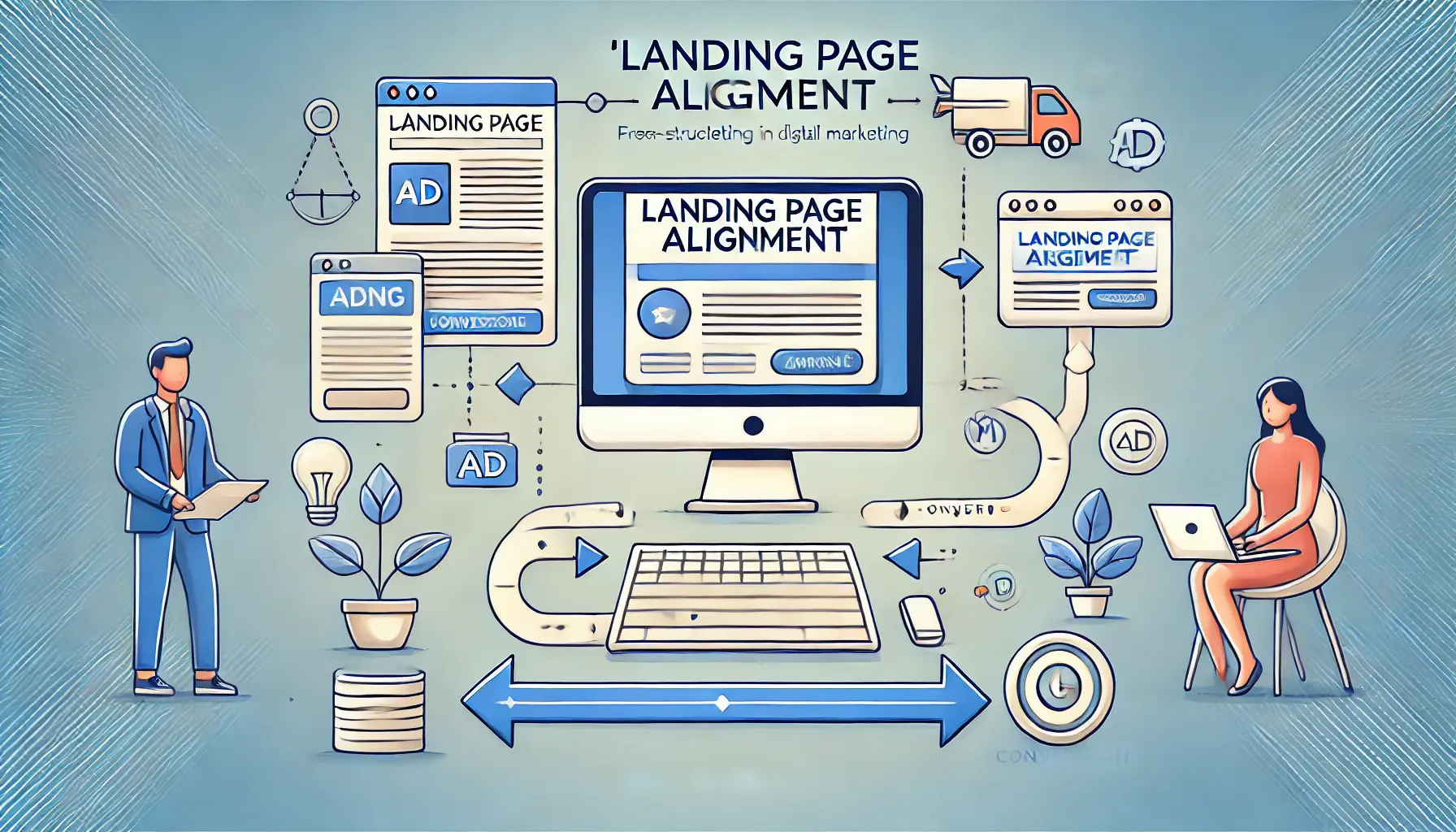
Visualizing the importance of aligning landing pages with ad content for effective marketing.
Landing Page Alignment
Google also considers the relevance of the landing page, ensuring it matches what the user expects to get once they click on the ad.
If your ad promises certain information but your landing page doesn’t deliver, your Ad Relevance score will decrease.
Ensuring a seamless transition between your ad and landing page is crucial for maintaining high relevance.
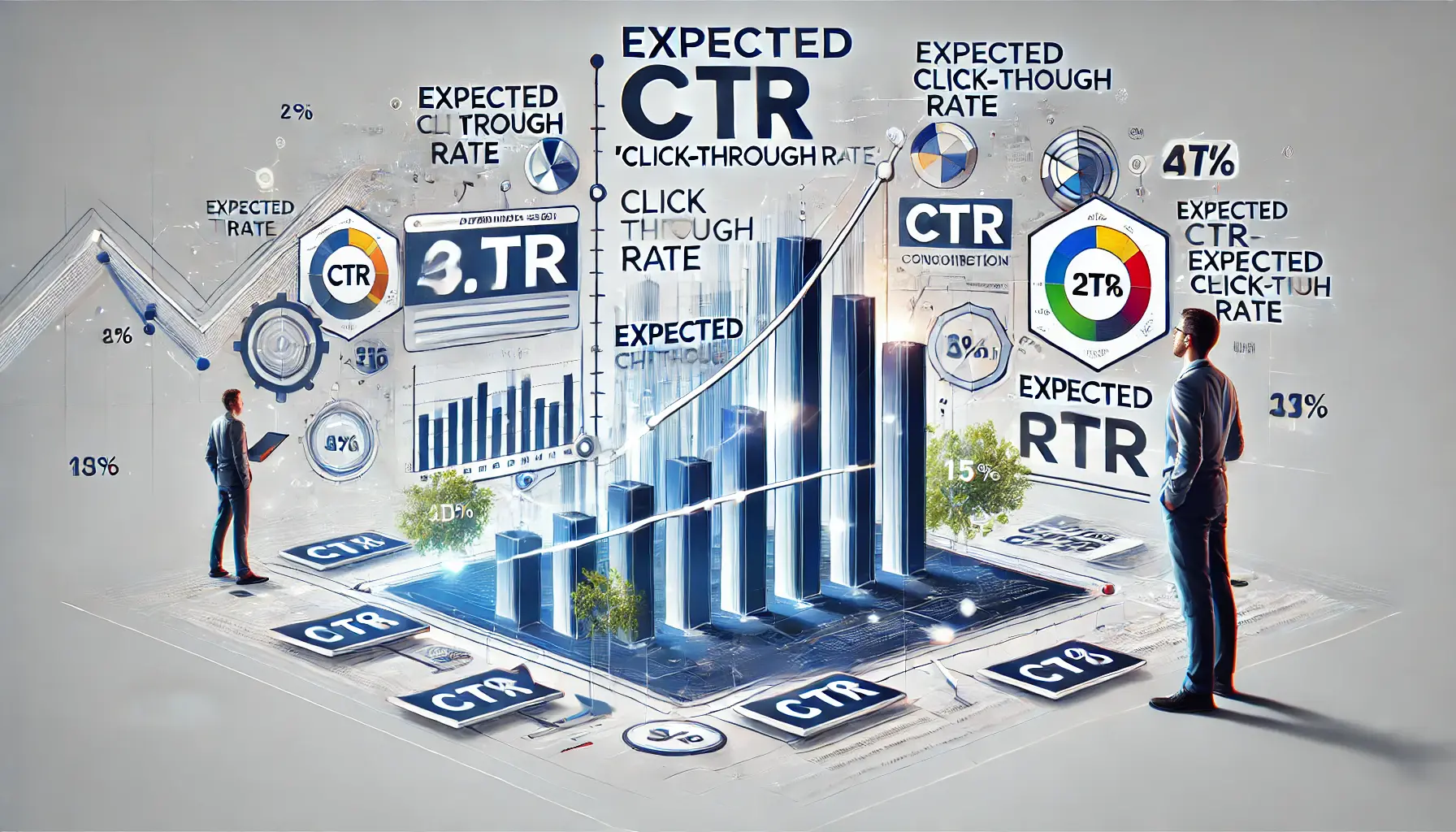
Illustrating the importance of expected CTR in evaluating ad performance.
Expected CTR
Another metric that Google uses to evaluate Ad Relevance is the expected click-through rate (CTR).
This is the probability that users will click on your ad because it’s relevant to their search query.
A higher expected CTR means your ad is more likely to get clicked, signaling to Google that your ad is highly relevant.
By improving ad copy and focusing on user intent, you can raise your expected CTR and improve your Ad Relevance score.
When you understand how these factors interact, you can optimize campaigns to achieve better Ad Relevance.
Next, we will cover ways to optimize your ad copy to match user intent.
Google measures Ad Relevance based on keyword-to-ad copy relevance, landing page alignment, and expected click-through rate (CTR).
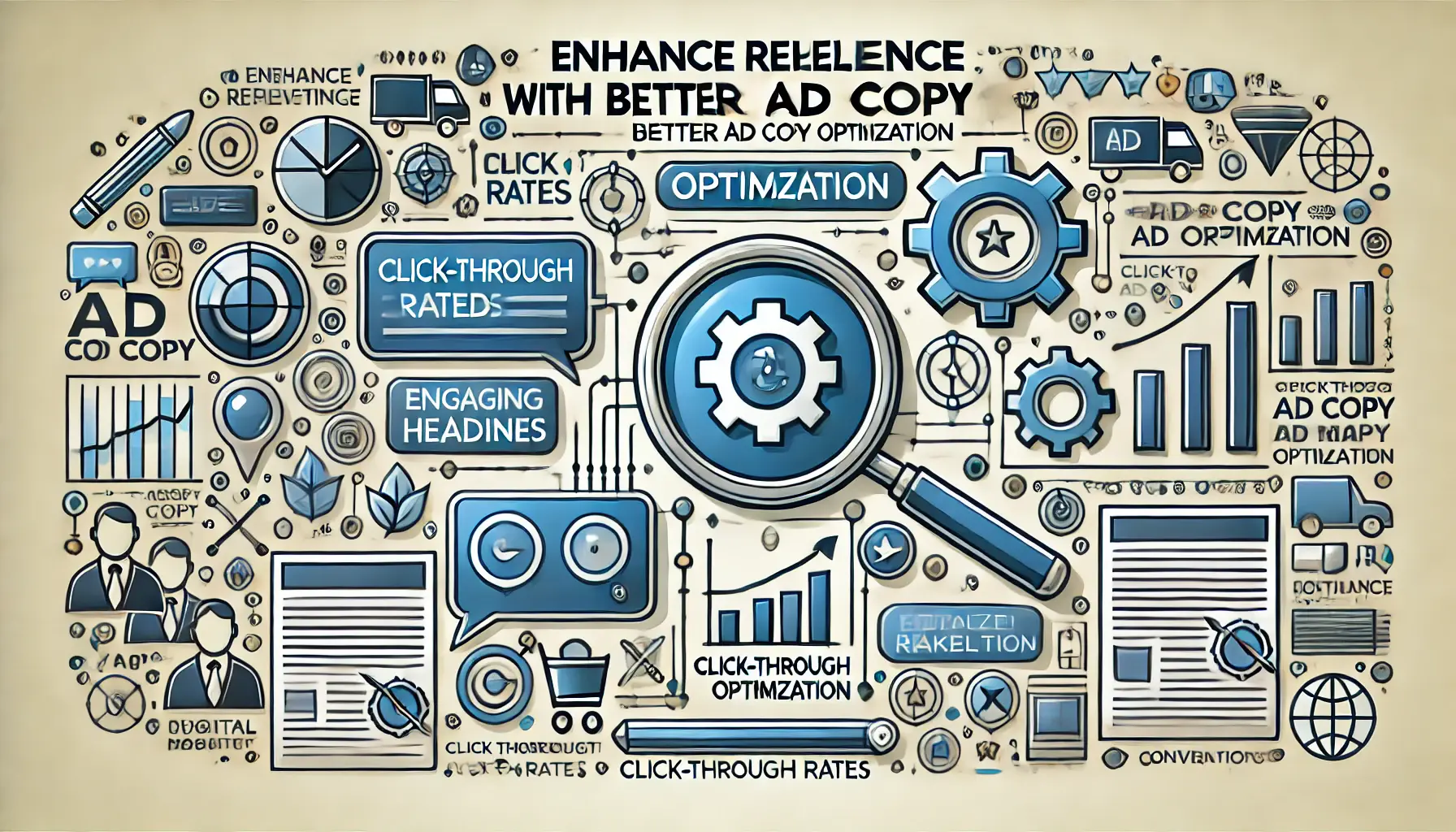
Visualizing the components of engaging and relevant ad copy.
Enhance Relevance with Better Ad Copy Optimization
Your ad copy is one of the most important factors to consider when you want to enhance Ad Relevance in Google Ads.
Well-optimized ad copy will ensure that your ad shows up for the appropriate searches while simultaneously increasing your chances of encouraging users to click.
Writing effective ad copy involves using the right keywords, writing clear and creative headlines, and utilizing every possible ad extension to build relevance.
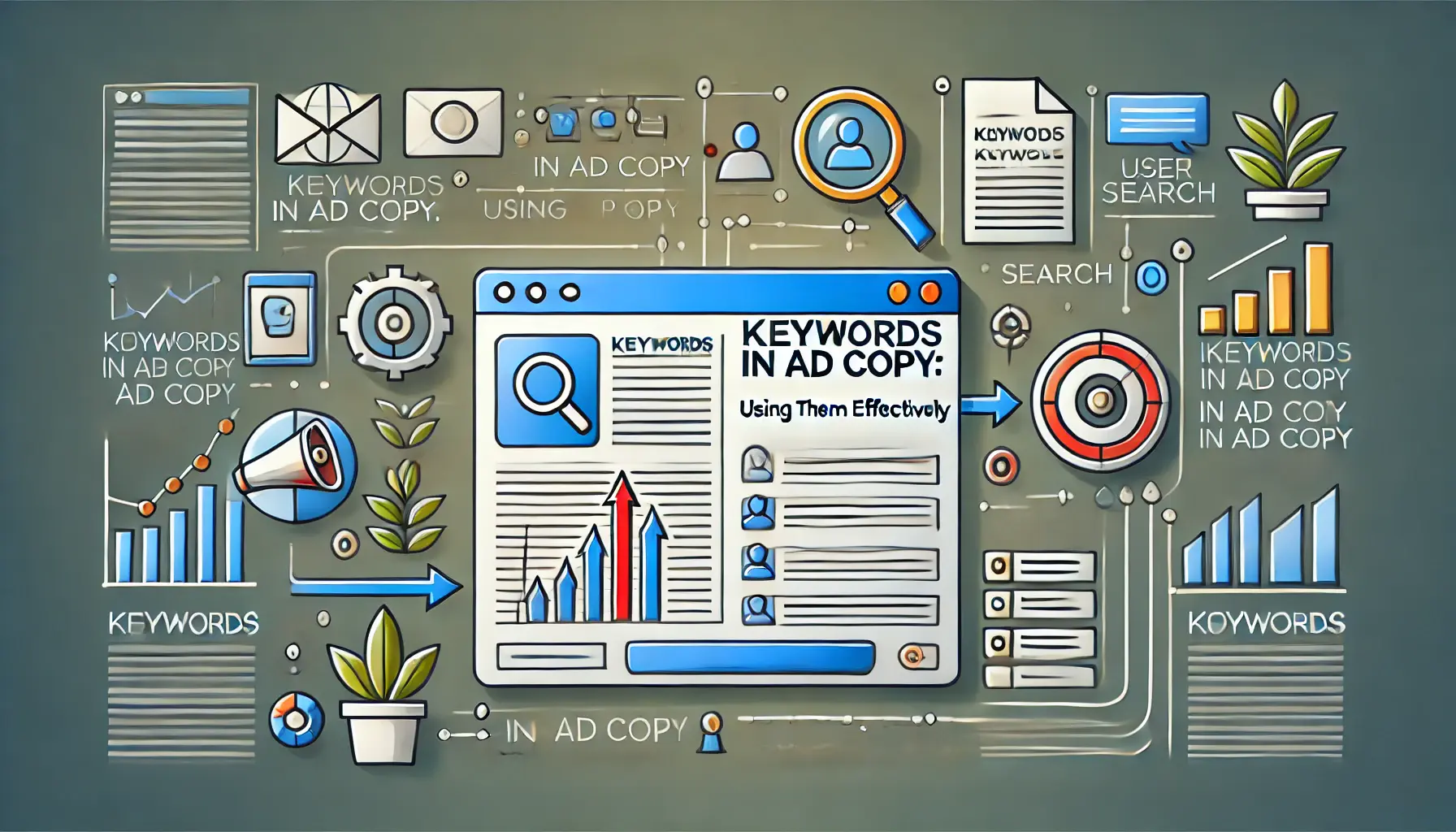
Visualizing the strategic placement of keywords for optimized ad copy performance.
Keywords in Ad Copy: Using Them Effectively
Keywords hold the key to unlocking Ad Relevance.
For that reason, to improve your ad copy, you want to make sure that the keywords you are bidding on naturally appear in the ad text.
Here are some best practices:
- Place primary keywords in the headline: This helps users immediately know your ad is relevant to their search.
- Use keywords in the description: Reinforce what was said in the headline and ensure a cohesive message.
- Avoid keyword stuffing: Overusing keywords can make your ad sound unnatural and less effective. Focus on natural-sounding ad copy that resonates with the user.

Visualizing the importance of headlines in capturing audience attention.
Writing Clear and Engaging Headlines
The headline of your ad is the first thing users will notice, so it needs to be clear, concise, and compelling.
A well-written headline increases your Ad Relevance by capturing attention and encouraging users to click.
Keep the following in mind:
- Address User Needs: Your headline should speak directly to the user’s intent. If they are seeking a solution, your ad should communicate how you’ll help them.
- Use Numbers or Offers: Headlines that include numbers, like “50% Off,” or specific offers tend to attract more clicks and signal relevance.
- Create a Sense of Urgency: Phrases like “Limited Time Offer” or “Today Only” can prompt users to take action immediately, increasing CTR and relevance.
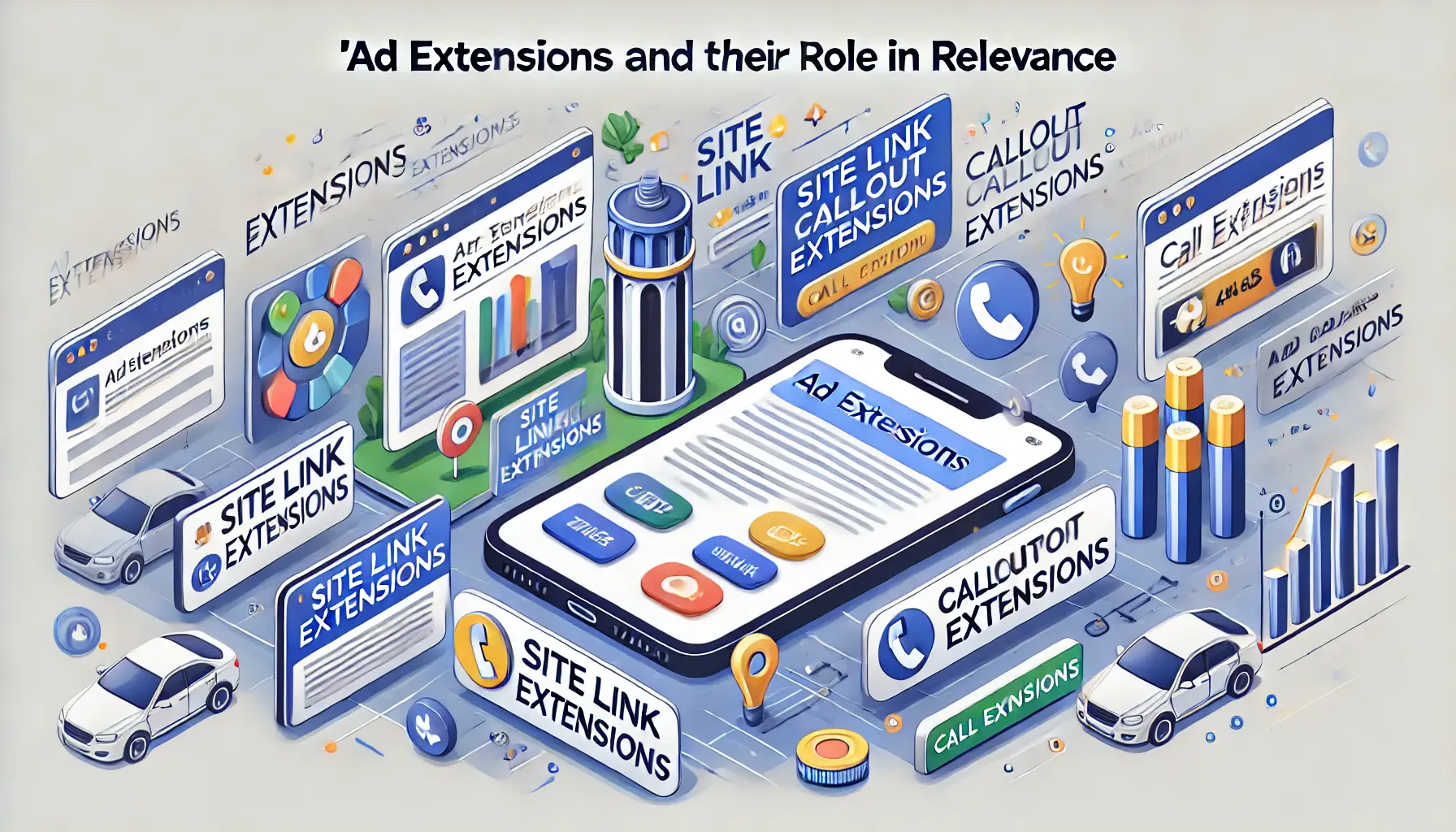
Visualizing the impact of ad extensions on ad relevance and user engagement.
Ad Extensions and Their Role in Relevance
Ad extensions add more context to your ads, making your Ad Relevance better.
Google also rewards ads with extensions by giving them better visibility.
Here’s how ad extensions can help:
- Site Link Extensions: Provide users with direct links to specific pages on your website, increasing the chances that they’ll find what they’re looking for.
- Callout Extensions: Highlight specific features or benefits of your product or service, enhancing relevance by addressing user needs.
- Call Extensions: Allow users to call your business directly from the ad, making it more useful and engaging.
Next, we will cover targeting strategies to further improve Ad Relevance.
Ad copy optimization is crucial for improving Ad Relevance, focusing on user intent and strategic use of keywords.

Visualizing the importance of targeting strategies for enhancing ad relevance.
Targeting Strategies to Improve Ad Relevance
Other critical aspects of improving Ad Relevance are how to optimize the targeting strategies in Google Ads.
Serving your ad to the right audience, at the right time, and in the right location can significantly enhance the relevance of your ad.
With better targeting, not only are you reaching people who are most likely to engage with your ads, but you’re also improving your entire campaign performance.
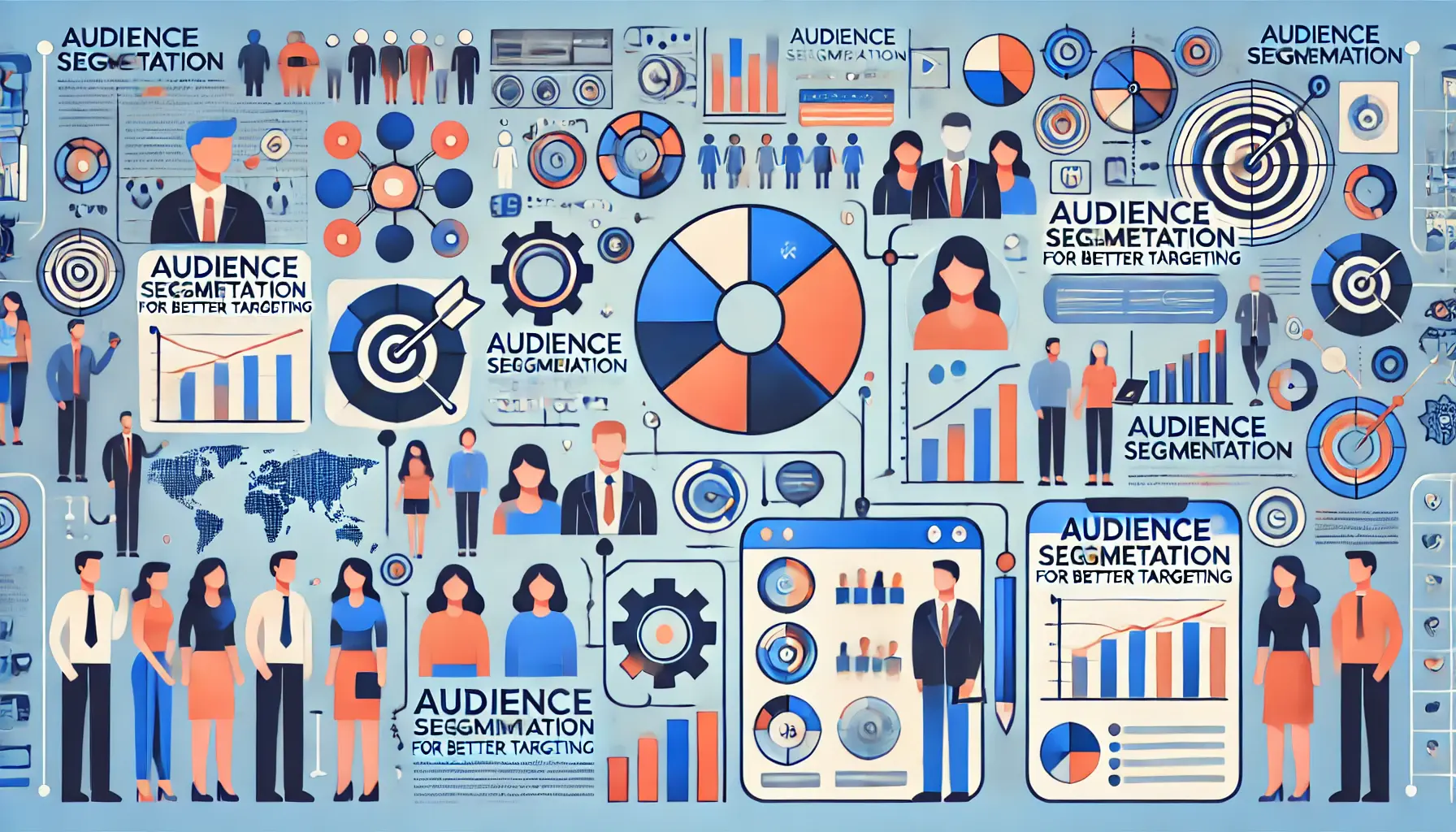
Visualizing distinct audience segments based on demographics and behaviors.
Audience Segmentation for Better Targeting
Segmenting your audience is an impactful way to enhance Ad Relevance.
You can break down audiences into specific segments and tailor your ads to the needs and behaviors of different groups.
With Google Ads, you have various ways to segment your audience:
- Demographic Targeting: Set advertising based on demographics like age, gender, parental status, or household income to ensure you are reaching the right person.
- Affinity Audiences: Target users who have expressed interest in specific topics or industries, making your ads more relevant to their preferences.
- In-Market Audiences: Reach users actively looking for products or services like yours, making them more likely to convert.
- Custom Audiences: Create audiences based on user behavior, such as website visits or app usage, helping you connect with your ideal customers.

Visualizing the elements of effective location and language targeting.
Refining Location and Language Targeting
For further enhancement of Ad Relevance, refining your location and language targeting is essential.
This ensures your ads are shown to people who are more likely to respond.
Here’s how:
- Location Targeting: Target regions, cities, or even postal codes to focus your ads on places where your target audience resides, increasing relevance.
- Language Targeting: Ensure your ads are served to users in the same language as the ad copy to enhance user experience and engagement.

Visualizing the importance of device preferences in enhancing ad relevance.
Leverage Device Preferences to Heighten Relevance
Device targeting can also be an effective method for increasing Ad Relevance.
By optimizing for different devices, you can create a smoother user experience.
Here are some strategies:
- Mobile-First Approach: With more users browsing on mobile devices, ensure your ads and landing pages are optimized for mobile to maintain relevance.
- Device-Specific Bidding: Adjust bids based on the performance of each device. If mobile traffic converts better than desktop, increase your mobile bids to capture more of that audience.
- App Targeting: For businesses with mobile apps, target users who have already downloaded or interacted with your app to improve relevance and engagement.
By applying these targeting strategies, you’ll see an improvement in Ad Relevance and overall campaign performance.
Next, we will dive into how optimizing your landing pages can take relevance even further.
Audience segmentation, location targeting, and device optimization can substantially enhance your Ad Relevance.
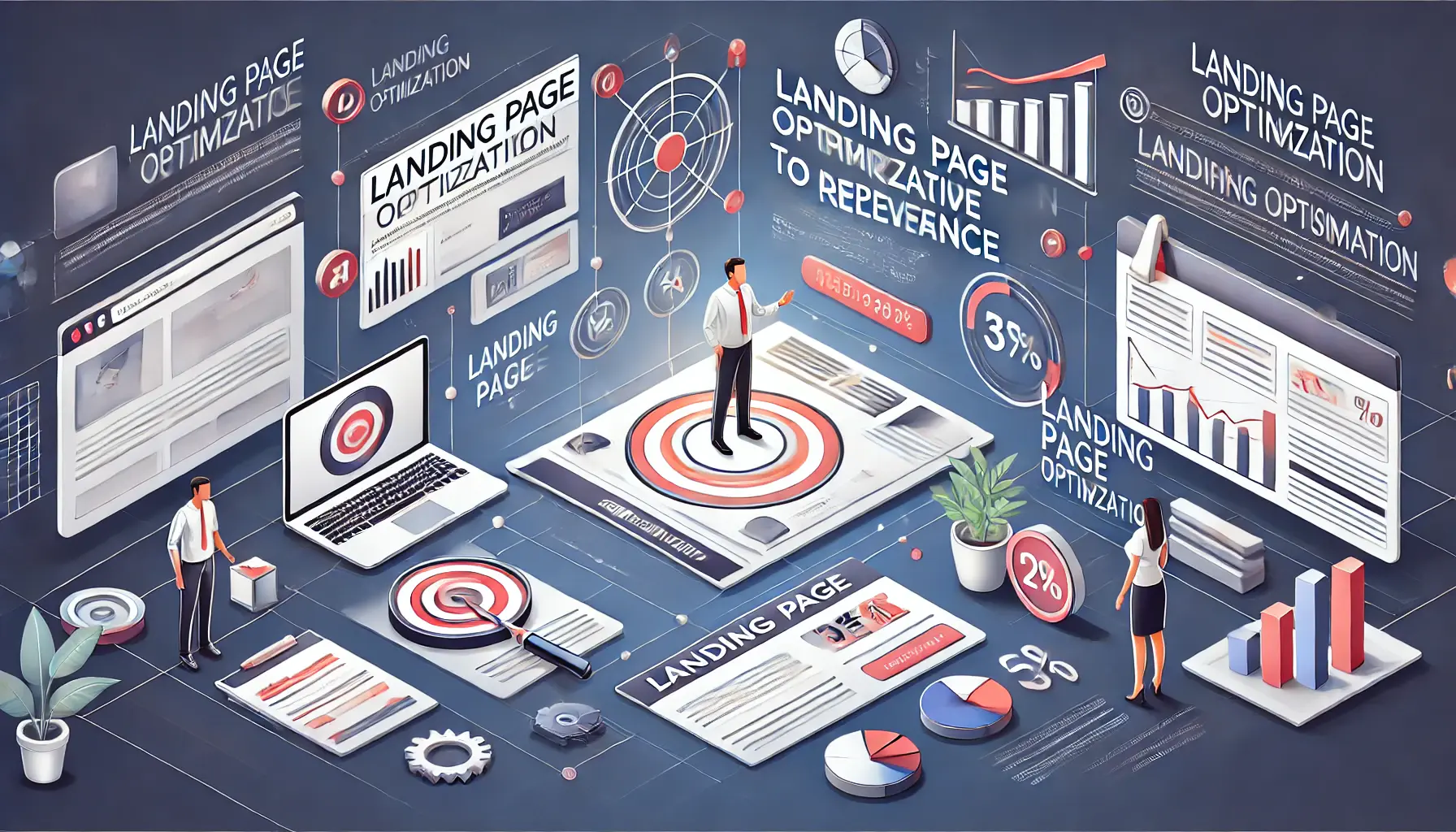
Visualizing the elements of effective landing page optimization.
Landing Page Optimization to Improve Relevance
Optimizing your landing pages is one of the most important factors in improving Ad Relevance.
Even with perfect ad copy targeted precisely at the right audience, a poorly optimized landing page can drive down your relevance score and increase bounce ratesThe percentage of visitors who leave your website after viewing only one page..
By aligning the information on your landing page with your ad content, you can ensure that users have a smooth experience from the moment they click your ad to the interaction with your content.
This not only improves relevance but also boosts your conversion rate.
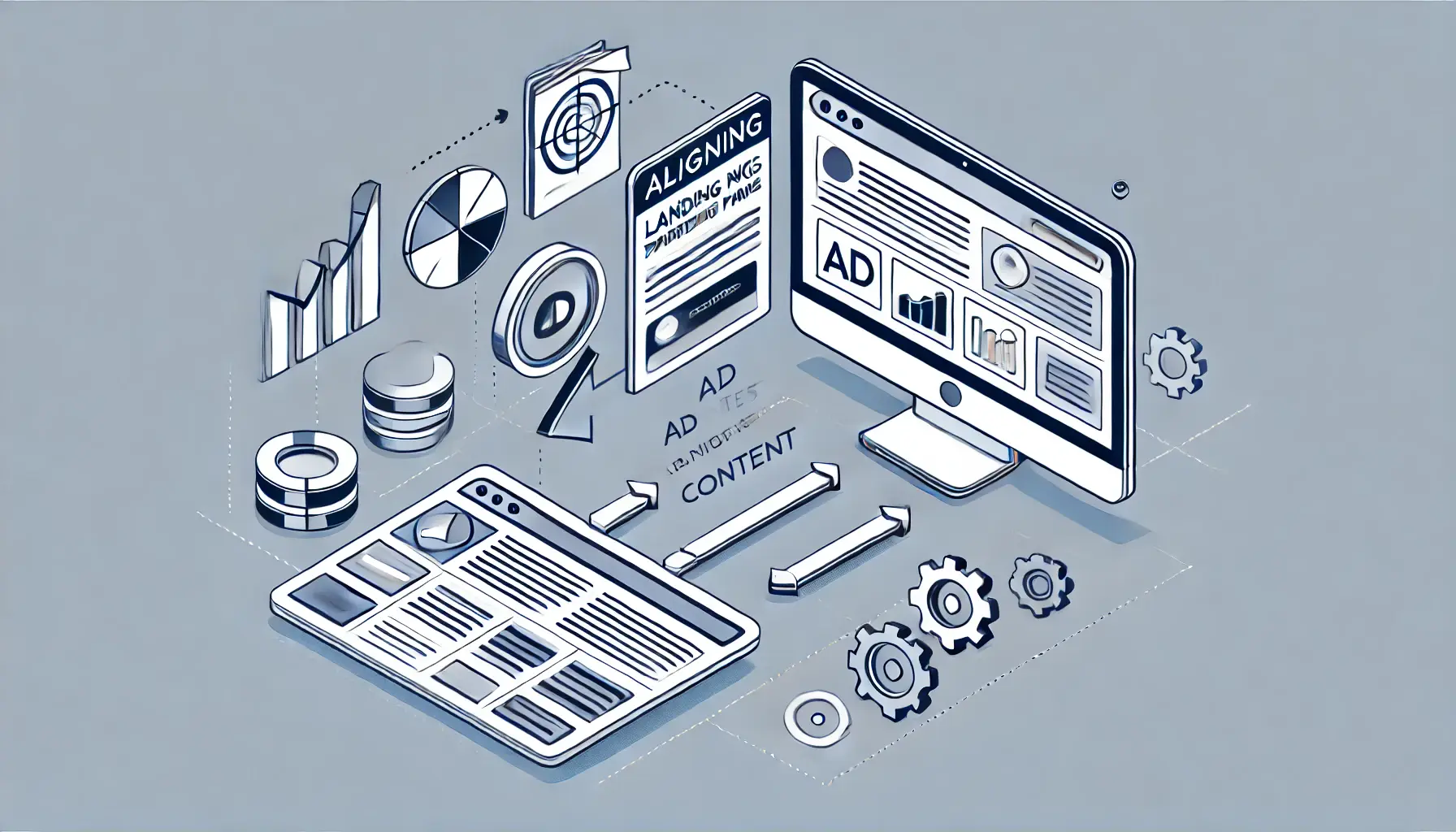
Visualizing the importance of aligning landing pages with ad content for user experience.
Aligning Landing Pages with Ad Content
Landing page optimization starts by making sure the content on your landing page lives up to the promise made in your ad.
When users click on an ad expecting specific product or service information, they should be directed to exactly that.
Here’s how to align your landing pages:
- Consistent Messaging: Keep the same messaging in your ad copy, using the same keywords and tone, to directly relate to your landing page content.
- Relevant Headline: Ensure the headline on your landing page is the same as the ad headline or closely related to maintain relevance.
- Clear Call-to-Action (CTA): Direct users toward a specific action, such as signing up, making a purchase, or downloading a resource, to match your ad’s intent.

Visualizing the importance of mobile optimization for improving user experience.
Mobile Optimization for Enhanced User Experience
Google rewards mobile-optimized landing pages with better ad placements and lower CPC.
To optimize for mobile:
- Responsive Design: Ensure your landing page adapts to various screen sizes and devices for a seamless user experience.
- Fast Load Times: Page speed is a critical ranking factor, especially on mobile devices. Make sure your landing page loads quickly to avoid high bounce rates.
- Simple Navigation: Simplify the layout and design for mobile landing pages to help users easily find the information they need and take action.
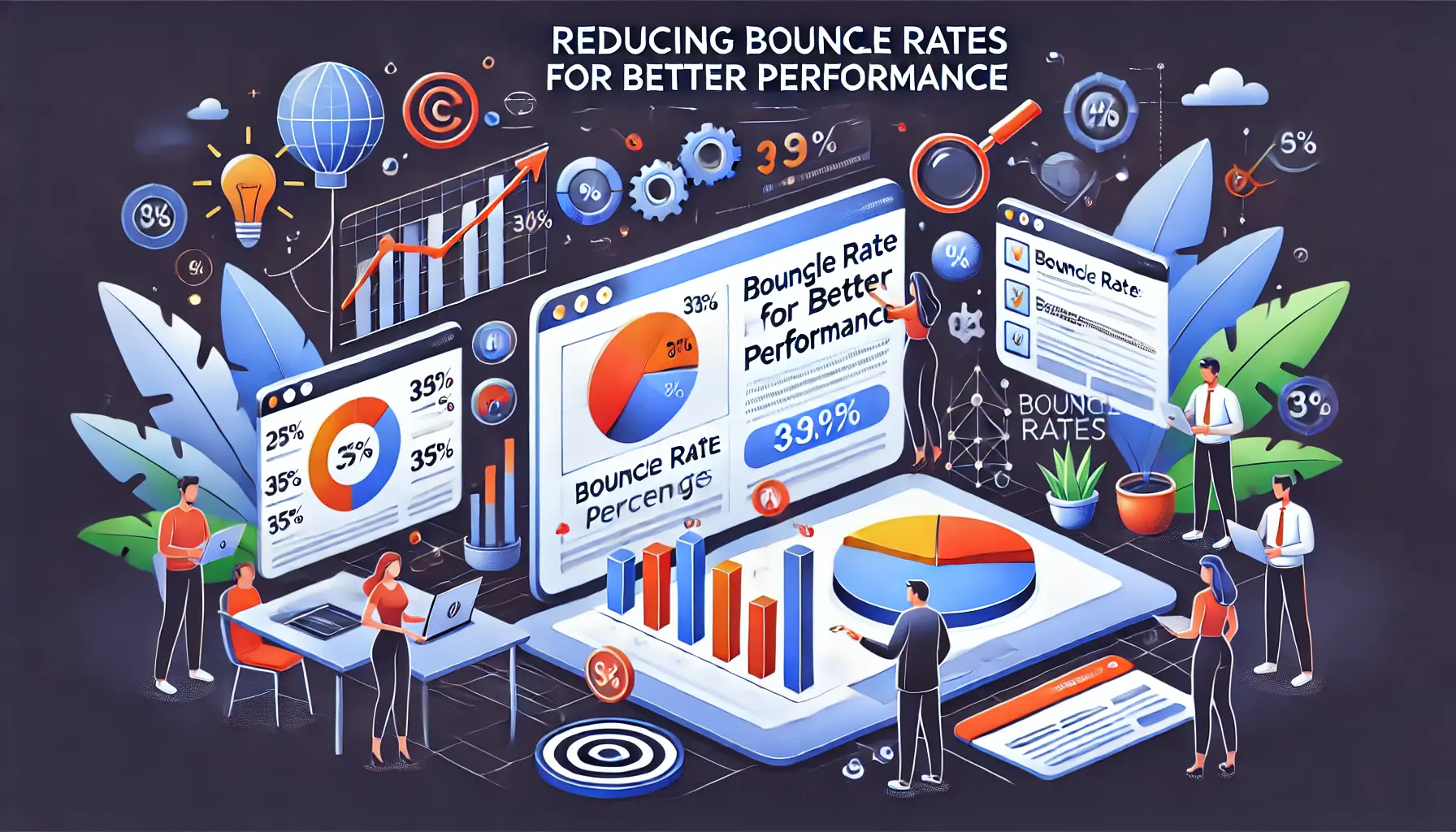
Visualizing metrics that highlight the importance of lowering bounce rates for improved performance.
Reducing Bounce Rates for Better Performance
A high bounce rate can lower your relevance score and hurt your overall campaign performance.
To decrease bounce rates:
- Engaging Content: Offer high-quality, engaging content that keeps users interested and encourages further exploration.
- Clear and Immediate Value: The value proposition should be apparent within the first few seconds of landing on the page, whether it’s a special offer or critical information.
- Minimal Distractions: Avoid clutter and unnecessary elements that distract users from your primary goal, such as too many ads or pop-ups.
In the next section, we will discuss how to analyze performance metrics and make adjustments for continued improvement in relevance.
Landing pages must deliver on ad promises for a seamless user experience, or else your relevance score will drop.
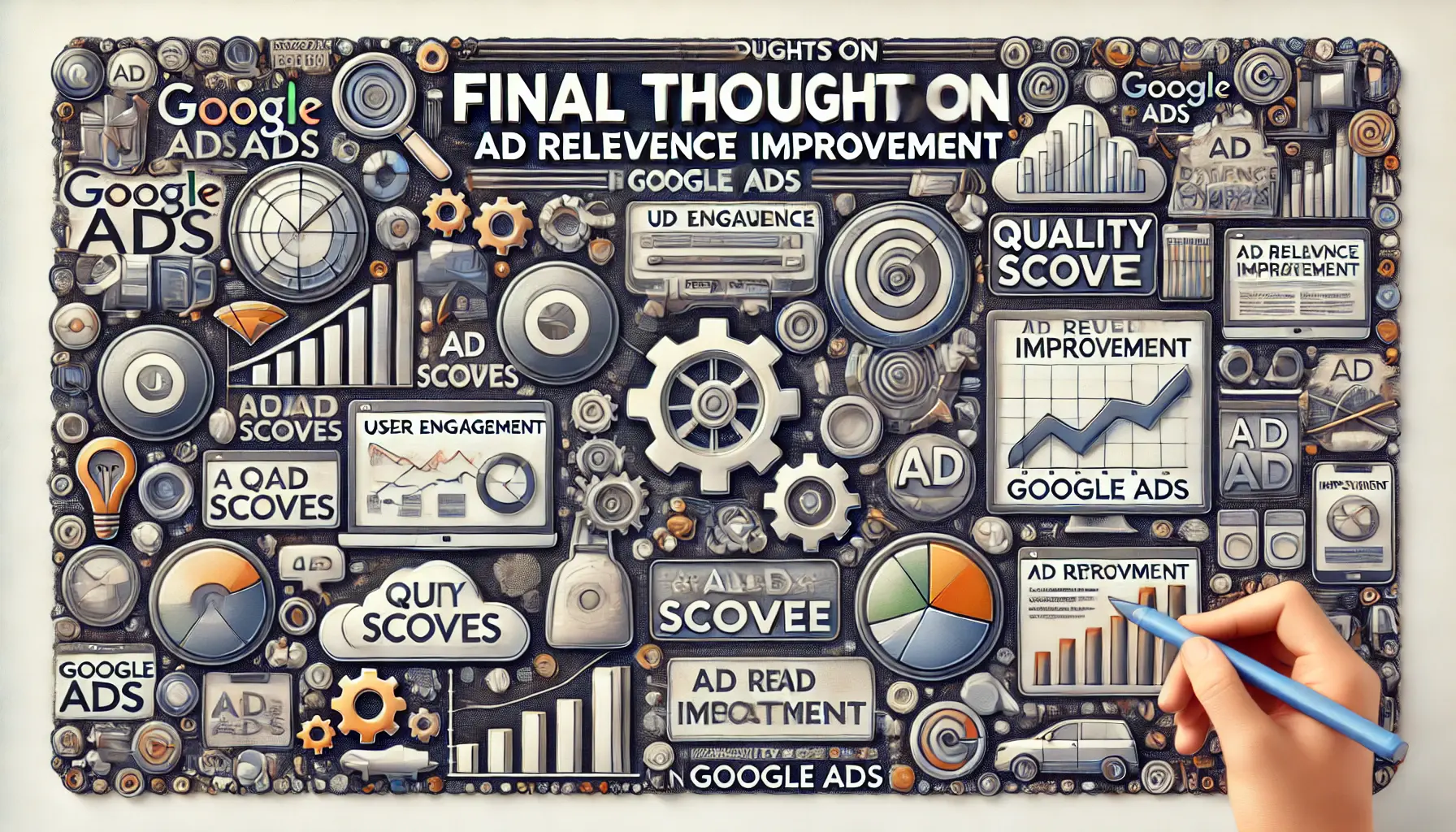
Visualizing the essential aspects of enhancing ad relevance in Google Ads.
Final Thoughts on Ad Relevance Improvement in Google Ads
Improving Ad Relevance in Google Ads is a multistep process that involves not only optimized ad copy but also targeted strategies towards segments and landing page alignment.
Each part of your campaign contributes to how your ads perform and how well they connect with your audience.
By refining these aspects, you enhance your relevance score while improving the overall performance of your campaign.
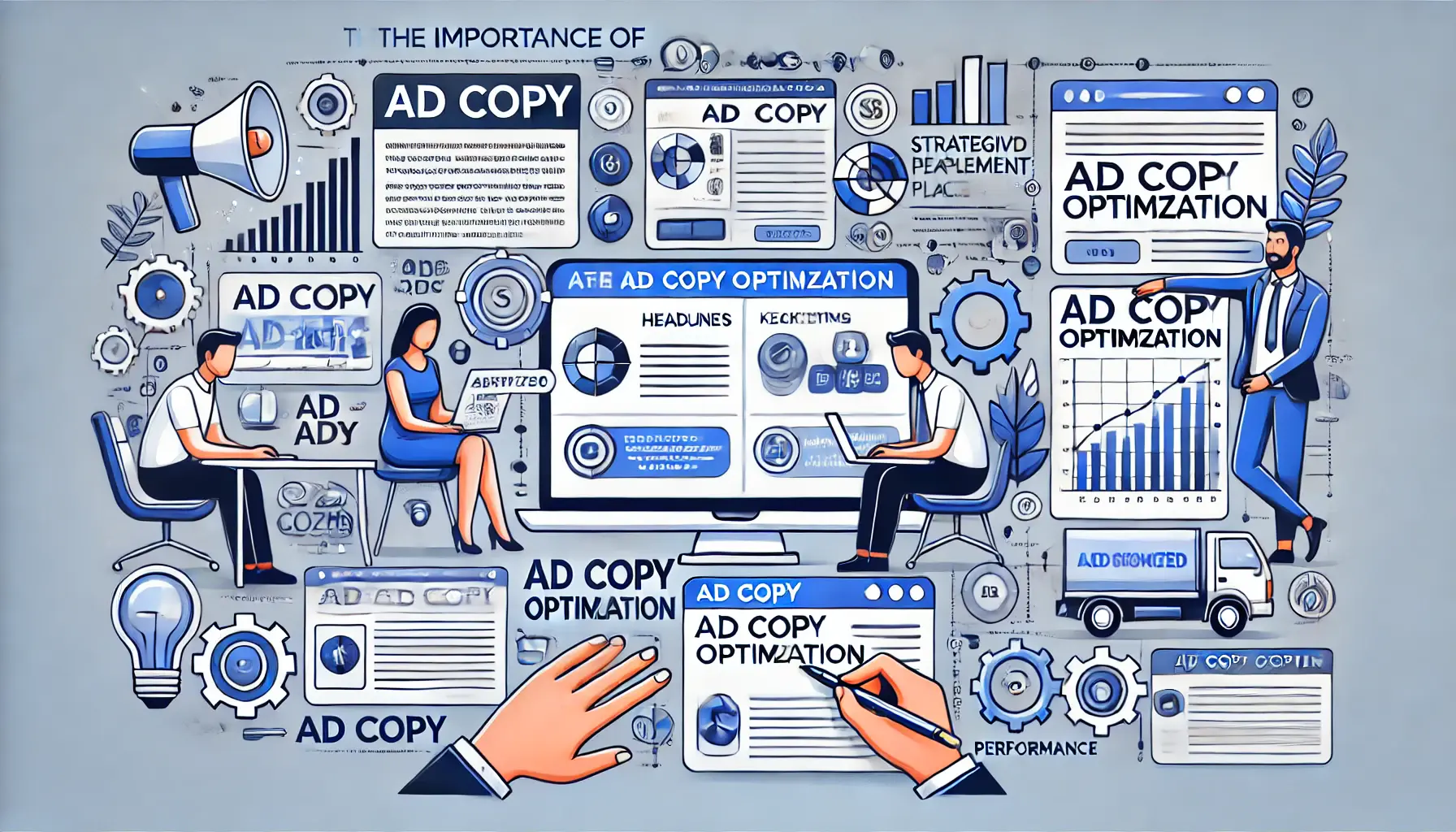
Visualizing the critical role of ad copy optimization in marketing success.
The Importance of Ad Copy Optimization
Your ad copy is the foundation on which Ad Relevance is built.
The relevance score will be determined based on the effective use of keywords in your headlines and descriptions, writing a clear and compelling message, and utilizing ad extensions.
The closer your ad copy aligns with the intent of the searches, the better your ads will perform in Google’s auction system, leading to higher click-through rates (CTR) and conversions.

Visualizing the importance of precise audience targeting in marketing campaigns.
Targeting the Right Audience
To further improve Ad Relevance, you need to segment your audience based on demographicsStatistical data about the population such as age, gender, and income., behaviors, and interests for more precise targeting.
Refining location and language targeting also contributes to gaining more relevance.
Don’t forget device-specific targeting, especially as mobile users dominate the landscape.
These strategies help ensure that your ads are highly relevant to your target audience, maximizing user engagement and return on investment.

Visualizing the elements of effective landing page optimization.
Landing Page Optimization: Closing the Loop
A well-optimized landing page is the final piece in Ad Relevance optimization.
Ensuring that your landing pages are relevant to the content of your ad and provide a seamless user experience is critical in reducing bounce rates and increasing conversions.
Focus on mobile optimization, fast load times, and clear calls-to-action that drive results and maintain relevance.
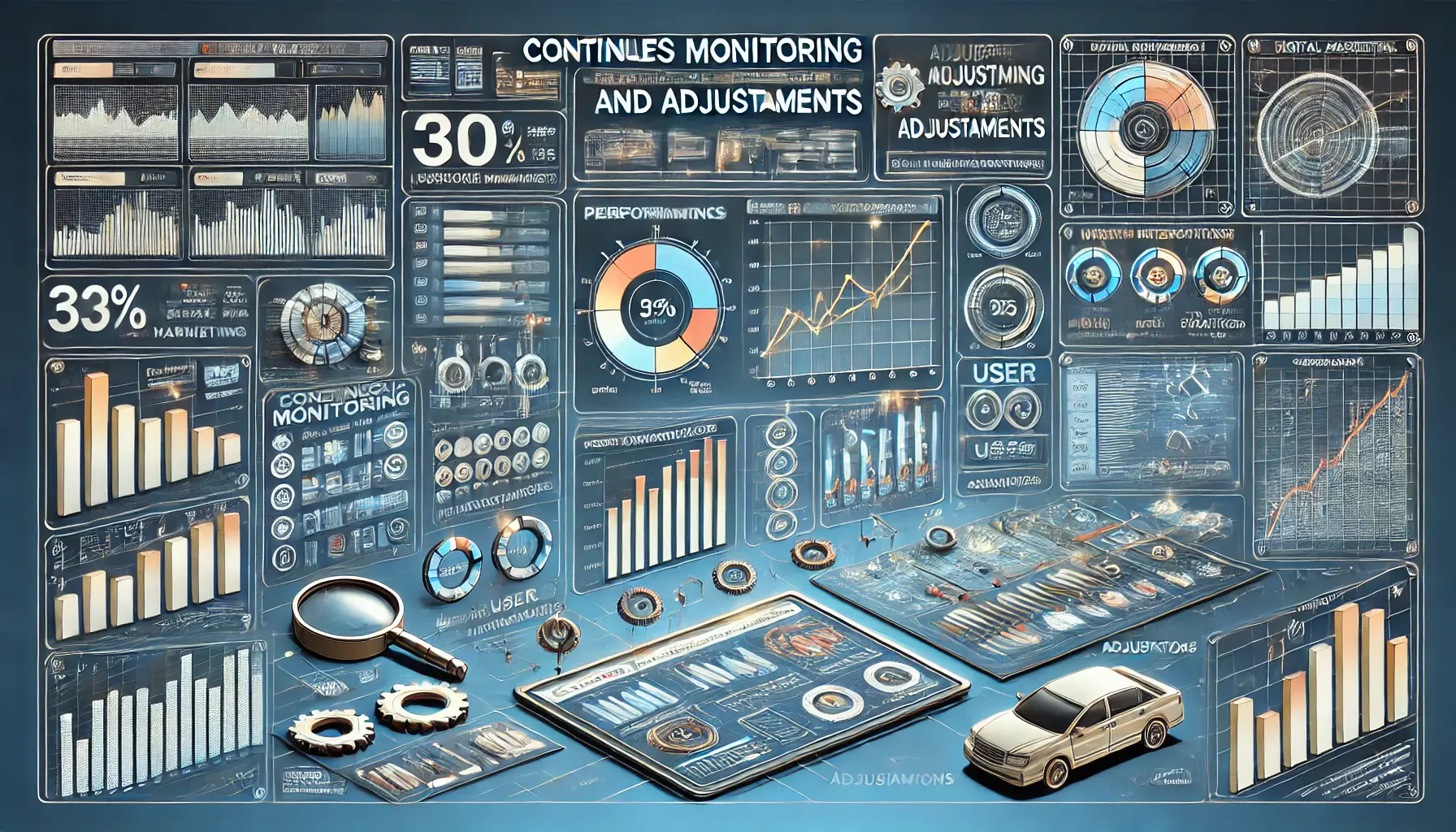
Visualizing the importance of continuous monitoring and adjustments in digital marketing.
Continuous Monitoring and Adjustments
Improving Ad Relevance is not a one-time effort.
It requires ongoing monitoring of key performance metrics and making necessary adjustments to ad copy, targeting, and landing pages.
By continually analyzing your campaign data and testing new strategies, you can ensure that your ads remain relevant and competitive over time.

Visualizing the critical actions needed to improve ad relevance in digital marketing.
Key Actions to Improve Ad Relevance
- Use relevant keywords effectively in ad copy and ensure consistency between ads and landing pages.
- Optimize targeting strategies based on audience segmentation, location, and device preferences.
- Ensure your landing pages are mobile-optimized and offer a seamless, engaging experience for users.
- Monitor performance metrics and continue making adjustments to keep your ads relevant.
By focusing on these core strategies, you can significantly improve your Ad Relevance in Google Ads and drive superior results across your campaigns.
With any form of digital marketing, being proactive and continuously optimizing your ads will ensure long-term success.
Continuous monitoring and strategic adjustments are essential to maintaining high Ad Relevance over time.
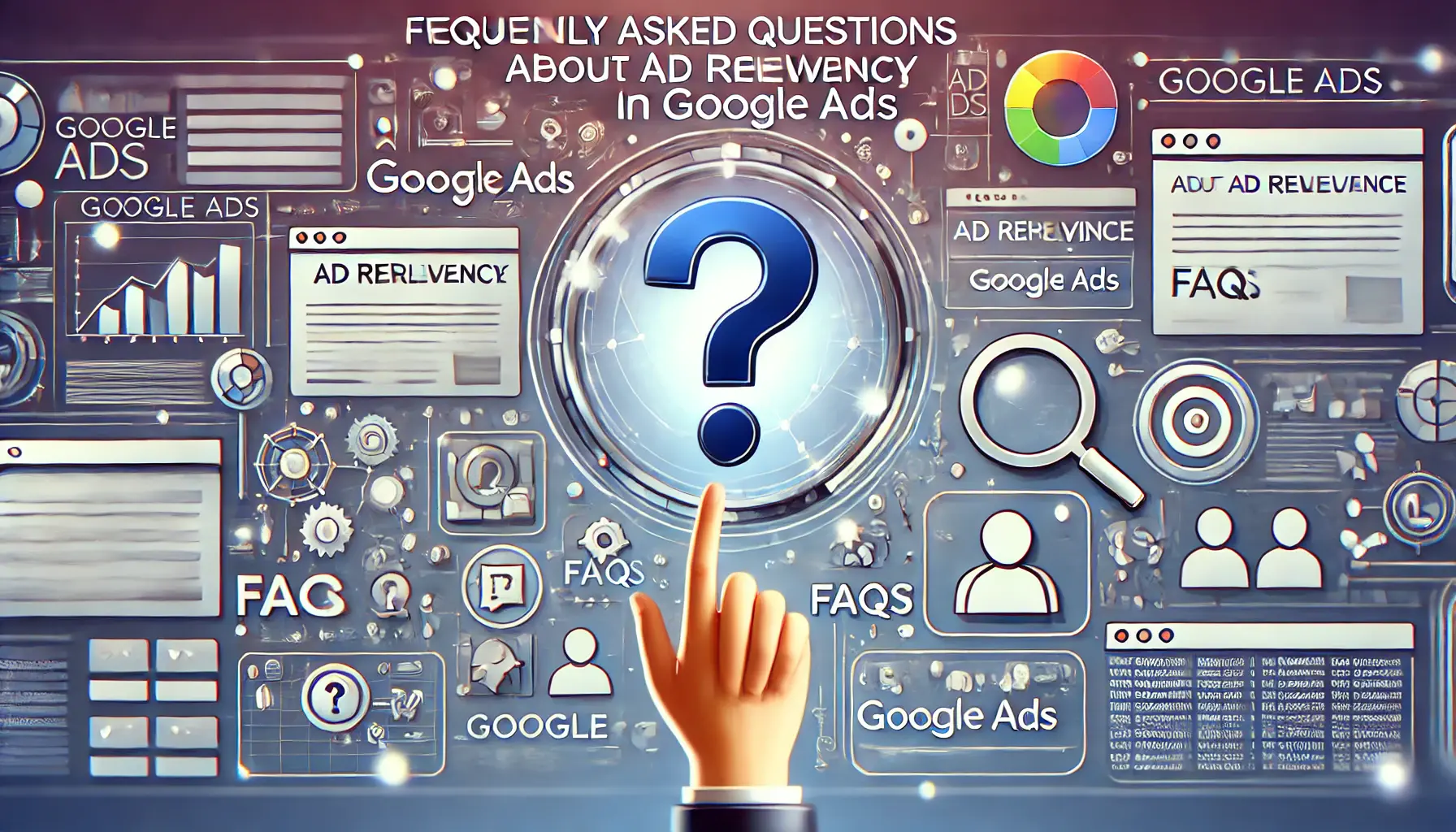
Visualizing common inquiries regarding ad relevance in Google Ads.
Your campaigns can be managed by an agency specialized in Google Ads, check out our service page.
Frequently Asked Questions about Ad Relevance in Google Ads
Here are some common questions about improving Ad Relevance in Google Ads and how to optimize your campaigns effectively.
Ad Relevance measures how closely your ad matches the user’s search intent.
It affects your quality score and determines how well your ad performs in auctions and its cost per click (CPC).
To improve Ad Relevance, use relevant keywords in your ad copy, align your ads with user search intent, optimize your landing pages, and ensure targeting is precise based on demographics and device preferences.
Ad Relevance is important because it directly affects your quality score, click-through rate (CTR), and conversion rates.
The more relevant your ads are to user searches, the better they will perform, and the lower your costs.
Yes, landing page optimization significantly affects Ad Relevance.
If your landing page aligns with your ad content and offers a seamless user experience, it helps improve your relevance score and reduces bounce rates.
Audience targeting plays a crucial role in improving Ad Relevance.
By segmenting your audience and using precise targeting, such as demographics and device preferences, you ensure your ads are shown to the right people at the right time.
Google calculates Ad Relevance by assessing how closely your ad copy matches the search terms users enter.
It’s one of three factors that determine your quality score, alongside expected click-through rate (CTR) and landing page experience.
Yes, mobile optimization can improve Ad Relevance.
Google rewards mobile-friendly landing pages with better ad placements, which lowers your cost per click (CPC) and improves your relevance score for mobile users.
